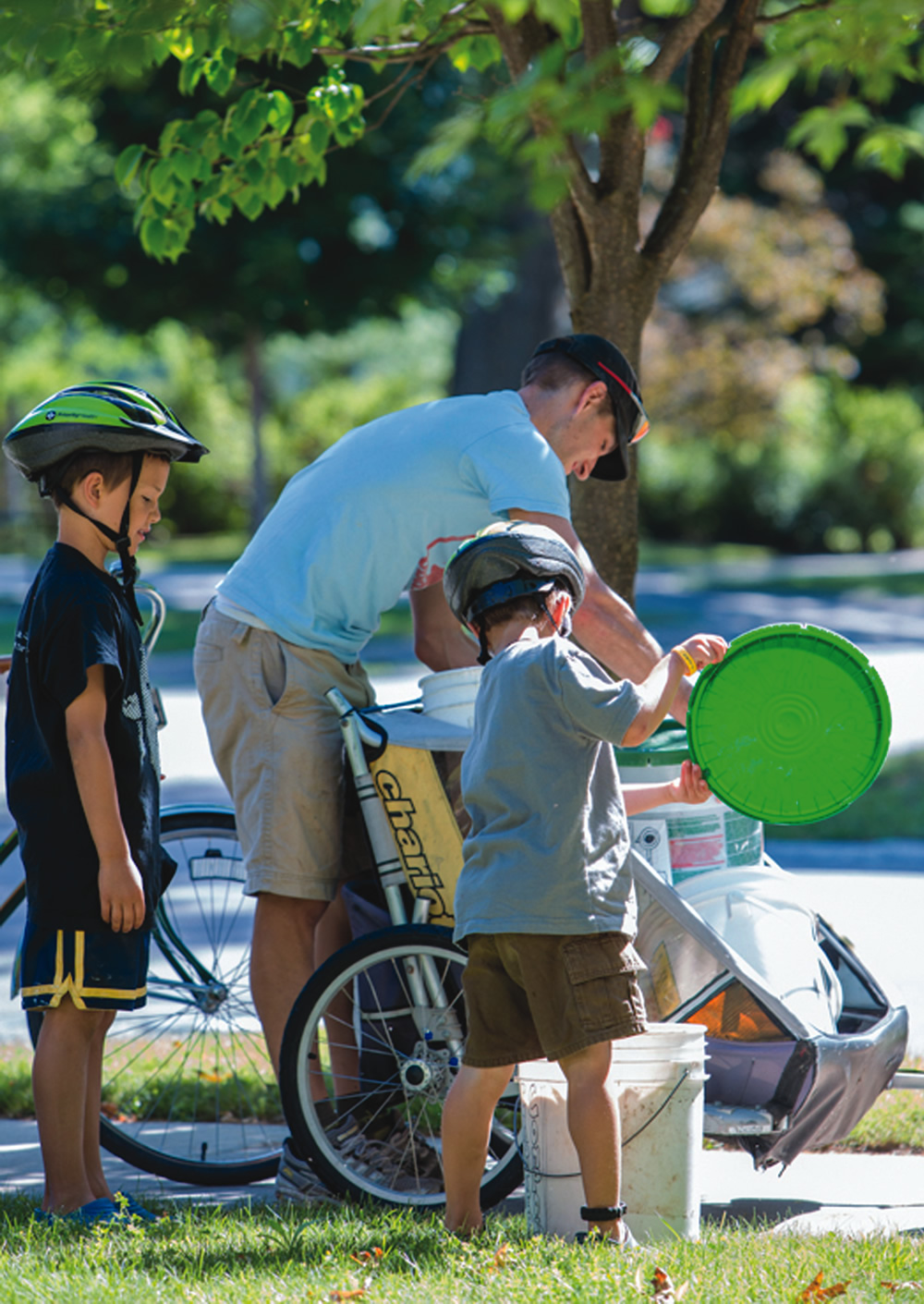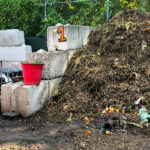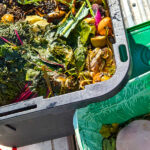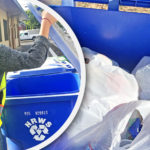Interviews with four small-scale collection services offer insights into innovative residential and commercial food scraps diversion.
Nate Clark
BioCycle March/April 2014
Organics diversion bans, coupled with a higher awareness of the ecological impacts of sending organics to the landfill, have been a catalyst for growth in food scraps diversion. Increased diversion has in turn created a niche for entrepreneurs who see an opportunity in servicing generators of organic waste, taking the material and processing it, or delivering it to a third party facility for processing. Food scraps collection businesses differ in scale, services, collection and hauling equipment, and clientele. BioCycle caught up with four different food scraps collection businesses to get a snapshot of this emerging sector, and to see how they are carving out a role for themselves in the organics recycling industry.
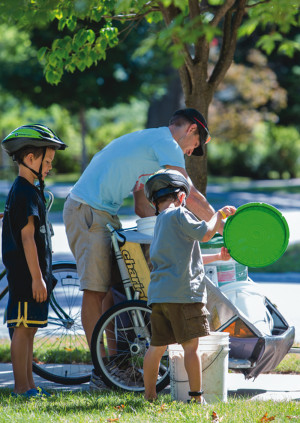
Ty Schmidt (middle), with sons Carter (left) and Jameson (right), work together to collect food scraps from their customers. Carter’s Compost employs the services of Jameson and three other kids in Traverse City to “sling buckets” and assist their neighbors in diverting food scraps from disposal. Photo by Beth Price
Carter’s Compost
Interview with Carter, age 9, and his father, Ty Schmidt, co-owners, Traverse City, Michigan
Carter, how did you get interested in bike-powered food scraps collection?
Well, my dad got me a worm bin when I was 2. Since then, I have been trying to make money. I sold “rolley polleys,” or worms, on my street corner for 10 to 15 cents, but that didn’t work out too well — I earned one dollar. My dad was blogging on the computer, and he came across Bootstrap Compost in Boston, Massachusetts, a food scraps pick-up service. He thought, “Wow that is really cool.” We have a trailer, we have bikes, we have buckets…and he sent me on my way.
What is the total number and sector of clients serviced?
The number of customers we service fluctuates, but in general, we say we have helped over 100 neighbors compost. Our goal is to try to graduate the neighbors we service, in other words prepare them with the knowledge and skills to compost on their own, so we are not interested in slinging as many buckets as possible or customer retention as much as compost education. At our maximum point, we were collecting about sixty 5-gallon buckets/week, but in winter, it gets to be less. We are taking a break this winter.
How do you process the material that you collect?
We have been doing all composting in backyards, including Carter’s Compost’s headquarters in our own backyard. We don’t have many community gardens in Traverse City so we started partnering with neighbors that had space to spare in their pile. We call these “sharing piles.” A “sharing pile” is when we distribute scraps to a neighbor’s backyard. In total, we have 18 different composting piles processing the organic material we collect.
Are food scraps readily available, or do you have to actively seek generators?
No, we do not need to seek organics. I get emails from people all time — I have had to turn people away. We do seek “browns” with our “#LEAVES4CARTER” program. More information on this program is available on our website.
How did you determine the price for your collection service?
Bay Area Recycling for Charities, a Carter’s Compost “sponsor” and friend, was collecting food scraps at a price of $20/month. Carter was only 7 when we started, and we were not sure how many people would be willing to pay. It turns out that $5 a month was too low, but we think $10 a month is just right. A big part of this is that Carter is able to save for college. He is making real money (I work for free).
How do you grow this type of business?
This is something that we are trying to wrap our heads around — where we want to take this. The demand is there. A vision for this business is being part of the community and keeping bike powered, youth driven and youth centric. We want to empower kids to get out there and sling buckets. Paperboys disappeared years ago, but today, it is a great job to be a compost boy or girl. It takes buckets, a bike trailer, and you are there. We didn’t even get the trailers we use now until a full year into it; we just used what we had (bike trailers used for carrying small children).
Another part of our mission is to encourage our neighbors and community members to complete the cycle — to grow neighborhood food with neighborhood compost on a small scale. When we give back compost, we ask people to take photos of their garden activities. Anyone can pick up kitchen scraps — what makes us a little bit special, is we are using it to grow neighborhood food made from neighborhood scraps.
Where do you think your business is vulnerable?
Our number one dilemma is space — too much awesomeness, too little space. I have approached Traverse City’s Parks and Recreation Department about the need for community gardens in our town. Community gardens would fit right into Carter’s Compost’s mission. Space is the reason we need to turn down people. It is not the time or the amount of buckets; there is just no place to compost the scraps.
How do you compete with traditional waste haulers that have a big investment in trucks?
I think it is both the price per pick up and that clients value our services. People support Carter because he is a cute kid that is well spoken — I get that. We also compete because we are bike powered. No one likes to see trucks rumbling down alleys. On a bike, we can stop to talk and meet neighbors — I know all my neighbors now. We have been able to build community through Carter’s Compost.
Where do you see your business in five years?
When people think of composting in Traverse City, I want them to think of Carter’s Compost. Traverse City is a trendy town that loves the environment and local food. Someday, I want Traverse City to be known for composting. Carter is into this — we are in it for the long haul.
The Composting Network, LLC
Interview with Joseph Brock, Owner, New Orleans, Louisiana
How did you recognize a need for a food scraps collection service?
I started out with community gardens first. In New Orleans, community gardens — everyone was building them. But they weren’t building a sustainable way to maintain gardens and feed the plants. Lots of community gardens went out of business in one to two years. We wanted to create a sustainable model that would work. What came out of that was the need for finding a resource for low cost plant food. And so, I developed “The Composting Network” as a business model to work with restaurants because they had the bulk of the organic waste. The Composting Network, LLC, is one of the only composting facilities in Louisiana — we definitely saw a need for it here.
What are some of the larger, more well-known generators that you service?
Tulane University, Loyola University, the Morial Convention Center, and Cochon restaurant, to name a few.
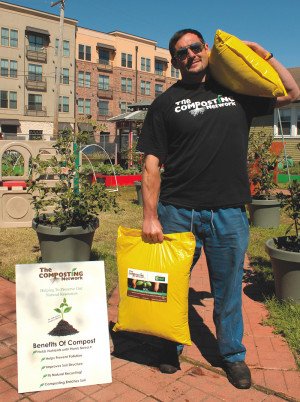
An employee at The Composting Network, LLC holds bags of finished compost made with food scraps the company collects from businesses and institutions in New Orleans.
How do you grow your business?
The way our business model is, we are strategically ready to grow. We have a cap price for collection service that we use as a price ceiling that we can lower. Once we get to a certain number of generators, the price for all generators goes down. In other words, the more generators that we service, the cheaper it is — we pass the savings onto them.
Do you give compost back to your customers?
We sell compost. What I tell people is, “When you recycle plastic, do you ask the company that processes the material, ‘Hey can I get that back when you are done with it?’” It doesn’t work like that. We do give discounts to wholesalers that carry our compost.
Where do you think your business is vulnerable?
It varies day to day. There are always items that we need, e.g., a larger compost bagger, and until we get those items, we can’t move at the speed we would like to go. So I would say infrastructure is where we are vulnerable. We are still really small.
What strategies do you use to maximize route density, thus collecting the most organics per collection route as possible?
Wherever we are presently collecting food scraps, we actively search for new customers in that area. If someone uptown wants to divert and we service them, the next strategy is to find people within a six-block radius that want to join as well.
When thinking about the long-term viability of your business, is it more important to offer a wide range of services to food scraps generators, or to offer a higher volume collection capacity?
When it comes to New Orleans, we are very different. We want to get everyone into the practice of diverting food scraps from the landfill, and with that, use methods to get people more involved in other “green” activities. For example, we were just asked to partner with Tulane University, Loyola University and Sodexo Food Service to create an “organics diversion” challenge between the two institutions.
Where do you see your business in five years?
When the City of New Orleans starts composting, we want to be involved. Until they decide it is cost-effective to compost, we will be composting.
Gainesville Compost
Interview with Chris Cano, co-owner, Gainesville, Florida
How does the “community compost network” function?
A community garden or organization (i.e., a restaurant) in town can choose to be a partner in our mission to move Gainesville “From Waste to Food.” This allows them to host a composting unit on site, therefore bringing them into the project, while also attracting interest among the community in what we are doing. We also make a share of the finished compost available to community composting partners who would like to grow their own food. All of the composting sites qualify as backyard composting operations, meaning they are no larger than 20 ft. by 30 ft. Our staff handles the whole process — setting up and building the composting unit (a 3-bay pallet system) and maintaining the system. We follow the composting guidelines established by the EPA, such as maintaining a temperature of 131oF for at least three days, while making sure to stay in line with accepted best management practices.
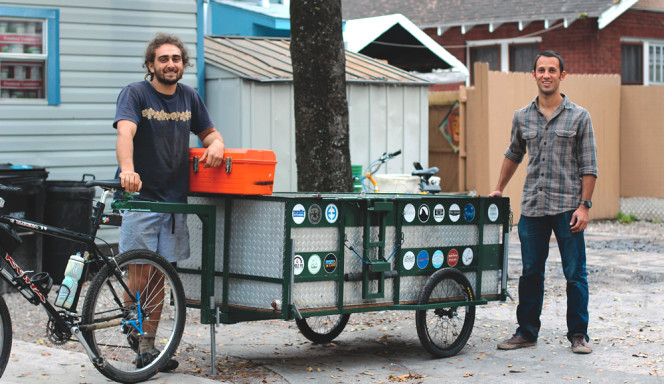
Steven Kanner, Chief Systems Engineer (left), and Chris Cano, Compost Experience Officer (right), owners of Gainesville Compost, pictured with the 500-lbs capacity bike trailer that Kanner created for bike-powered food scraps hauling in Gainesville. Photo by Kelsey Grentzer
How did you determine the price for your collection service?
Our strategy has been to deliberately offer a low price so that we can encourage entry into our service and focus on producing a larger volume of soil amendments [compost] that can benefit our community compost network. Rather than offer a premium collection service, we like to offer a service that is not prohibitive in price, and is attractive to a wide range of people. Our mission is to move Gainesville “From Waste to Food,” and we want to keep barriers [to generators] low so we can actually be able to do that. Our main priority when determining price was to pay our team of Bike Crew members, and not necessarily charge too much of a premium above that.
How do you grow your business?
There is a lot of opportunity to scale up by developing relationships with more community composting partners in regions throughout town. A major part of our mission, and a strategy for making the bicycle a viable vehicle for food scraps collection, is to develop a network in tandem with it. By developing more community composting partnerships, the distance each Bike Crew member must ride to drop off food scraps is reduced. Most of the Bike Crew member routes are under a mile from restaurant to composting center. This network can enable us to do more of our services efficiently. If we master bicycle logistics in a way where we have a broad network of generators and community composters, then we can be extremely efficient and competitive in offering our services at low prices.
An associated benefit is that the more partnerships we develop, the more opportunities it opens up to other possibilities and revenue streams. If we get a restaurant to sign up and are collecting food scraps from them in the most cost-effective way, then we are able to open the door to a relationship such as selling our garden amendments from that restaurant. This opens up new markets to other people in town.
Do you foresee a need to invest in equipment with a larger carrying capacity?
We do want to invest in equipment with larger carrying capacity, but we want to focus on bicycle power. Something that we are looking at for the future is an electric assist bicycle. There are some claims that people have hauled up to 2,000 lbs using electric assist bicycles.
It is important to mention that there are practical benefits associated with bicycle collection beyond just being eco friendly. Bikes are able to maneuver through tighter quarters in downtown Gainesville (having large trucks would take up more space and might be a noise nuisance). Another benefit is we don’t deal with the traffic barrier as much as large vehicles. Bikes don’t have as many parking or unloading issues, and enable us to stop right next to restaurants.
Do you have any competition with traditional, larger hauling businesses?
I don’t necessarily think we are competitors — certainly traditional waste haulers are much larger and more capital intensive. We believe that it is a good thing for everybody if this industry is growing. We also service different types of generators, and offer certain benefits that allow generators to do certain things that large hauling services can’t. We are able to show tangible benefits from our business throughout town. We are a local business that is enabling local partners to grow more local food using our soil amendment, Soil Food. This makes us attractive to restaurants and residents that have an ethic of sustainability.
How do food scraps generators benefit from your business?
We get the word out about the generators we service. This includes putting their logos on our bike trailers, marketing signs, and website. Whenever we ride to a restaurant with our bike trailer — decked out in restaurant logos and our Gainesville compost label — restaurant customers notice. It is such a cool thing for a restaurant owner to wave to a Bike Crew member picking up food scraps. It creates this awesome community feeling that reflects on the restaurant and is apparent to customers. And, the restaurant owners feel really good seeing customers’ response to our service.
Furthermore, restaurants that stock Soil Food are able to show customers how they are not only diverting waste from the landfill, but also creating something that is enabling people to grow food in our community.
What strategies do you use to maximize route density, thus collecting the most organics per collection route as possible?
A lot of the revenue from our collection service goes to our Bike Crew members, who are paid per container that they collect. This creates an incentive for Bike Crew members to increase participation in the region that they service, thus increasing collection route density. This makes the Bike Crew a more attractive job, and allows the team to be able to more rapidly collect from a smaller area while still making good earnings. We also offer the Bike Crew sales commission for inviting new partners on board, so each rider has an incentive to develop more density in their region, and is able to increase the revenue potential for their route each week.
Where do you see your business in five years?
If it comes to a city or county-led composting initiative, we would like to be factored into the picture. I would like to see this idea of bicycle-powered food scraps diversion gain traction, and to have it be recognized as a viable and inspiring model for handling waste — a model that is not dependent on trucking waste out of town to be handled out of sight, but where waste is recognized as something that can be used to benefit the community that produces it. I would really like to see restaurants embrace the idea of being connected to food waste by demonstrating to customers how their food scraps are being used to contribute to something positive. A customer can go to a restaurant, see a container of Soil Food, and say, “When I eat here, this is the outcome.”
Zero Waste Today
Interview with Debian Thacker, Vice President, Sales & Marketing, Raleigh, North Carolina
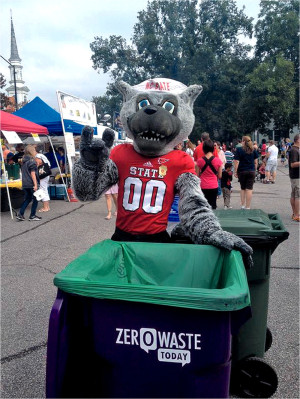
Mr. Wuf, mascot for North Carolina State University, stands next to a Zero Waste Today collection tote at the Town of Cary’s 2012 Lazy Daze Festival.
How did you recognize a need for a food scraps collection service?
We learned that over 50 percent of what is going to the landfill is food scraps and paper waste; we want to help divert that material from the landfill. Multiple sources, including the City of Raleigh Solid Waste Services, indicated the need for this type of business.
Are food scraps readily available, or do you have to actively seek generators?
Just as municipal recycling was a new concept years ago, so is food scraps diversion today. More people are becoming educated about the process, and as they learn about it, they become interested and want to participate in a program. We believe that education is how our business will grow. Food scraps diversion isn’t as progressive (or mandated) as it is on the West Coast, but North Carolina is beginning to embrace sustainability issues more so than in the past and education is key.
What is a challenge for your business?
The most challenging part of our business is educating customers to properly separate the material they put into the compostables bin so that it is readily accepted by the composting facilities we work with.
Do you have any competition with traditional, larger hauling businesses?
We serve small to medium size restaurants and businesses, which is not the focus for large haulers. Typically, food scraps diversion is not the kind of business the larger haulers choose to enter (at least at this time). Larger companies need to have a higher volume of customers and established routes to make a profit. Zero Waste Today is passionate about educating the community and ensuring our customers receive the very best customer service.
Where do you see your business in five years?
In five years we hope to have raised brand awareness as the preeminent food scraps diversion service company in Raleigh and the surrounding areas. We believe in starting locally and then branching out. We’d love to offer service in Charlotte, Winston-Salem and other cities within several hours from Raleigh. We believe businesses will embrace our mission of, “food scraps diversion for a sustainable tomorrow,” but it will require education. Ultimately, the awareness of the positive impacts that come from organics recycling will lead people to want to become socially responsible citizens. Our first customer, the manager of The Morning Times, exemplified this when she said, “It feels good to know we’re doing the right thing. I believe it positively impacts our guests.”
Wrap-Up
Despite the diversity between each of the businesses we spoke with, a recurring theme kept emerging. The work that these entrepreneurs are doing in their communities does not stop at the limits of their towns or cities. Each business owner was curious about what each other was doing, eager to share their successes and failures and offer tips on how to acquire an affordable bike trailer or strategies for growing their clientele. There was no sense of competition — just an acknowledgement that growing their industry and exhibiting their efficiencies and effectiveness will benefit all of them in the long run.
We were struck by an unspoken acceptance among the group that it was their responsibility to prove their model as a viable option for food scraps collection in their regions. Chris Cano, co-owner of Gainesville Compost, put it best when he said, “…we are champions of this mission; not necessarily owners of it.”


